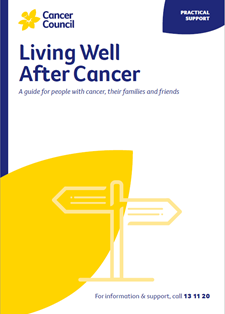- Home
- Cancer Information
- Living well
- Living well after cancer
- Adjusting to life after treatment
- Finding a “new normal”
Finding a “new normal”
When treatment ends, you may expect that life will soon return to normal. Or you may see the diagnosis as an opportunity to make changes to your life. Over time, cancer survivors often find a new way of living. This process is commonly called finding a new normal and it may take months or years.
Learn more about:
- How cancer can be a life-changing experience
- Adjusting to the new normal
- Myths about the end of treatment
A life-changing experience
Most people say cancer is a life-changing experience. Although having cancer can be very challenging, some people find positive aspects. They may discover an inner strength they didn’t know they had, develop new friendships during treatment or find other sources of support.
Cancer may prompt you to reconsider your outlook on life. This shift is often gradual; even positive change can take time. You may:
- place more value on spending time with family or friends and choose to focus on the more meaningful relationships in your life
- spend more time doing activities you enjoy, start new activities or visit new places
- reconsider your career goals and work values, and decide to work fewer hours or take on a different role
- have a new focus on healthy living.
I’ve changed my career path and am studying community services in order to help people through changes in their life. The way you view life is different after cancer.
Pete
Podcast for people affected by cancer
Listen now
More resources
Prof Michael Jefford, Medical Oncologist and Director, Australian Cancer Survivorship Centre, Peter MacCallum Cancer Centre, VIC; Lucy Bailey, Nurse Counsellor, Cancer Council Queensland; Philip Bullas, Consumer; Dr Kate Gunn, Clinical Psychologist and Senior Research Fellow, Department of Rural Health, University of South Australia, SA; Rosemerry Hodgkin, 13 11 20 Consultant, Cancer Council WA; Prof David Joske, Clinical Haematologist, Sir Charles Gairdner Hospital and Clinical Professor of Medicine, The University of Western Australia, WA; Kim Kerin-Ayres, Clinical Nurse Consultant, Cancer Survivorship, Concord Hospital, NSW; Sally Littlewood, Physiotherapist, Seymour Health, VIC; Georgina Lohse, Social Worker, GV Health,VIC; Melanie Moore, Exercise Physiologist and Clinical Supervisor, University of Canberra Cancer Wellness Clinic, ACT; June Savva, Senior Clinician Dietitian, Nutrition and Dietetics, Monash Cancer Centre, Monash Health, VIC; Dr Elysia Thornton-Benko, Specialist General Practitioner and Research Fellow, University of New South Wales, NSW; Prof Janette Vardy, Medical Oncologist, Concord Cancer Centre and Professor of Cancer Medicine, The University of Sydney, NSW; Lyndell Wills, Consumer.
View the Cancer Council NSW editorial policy.
View all publications or call 13 11 20 for free printed copies.
Need to talk?
Support services
Life after cancer treatment
Programs and support for people who have finished treatment
Cancer Council Online Community
A community forum – a safe place to share stories, get tips and connect with people who understand
Cancer information
Nutrition and cancer
How to eat well during and after cancer treatment
View our publications
Guides and fact sheets for people with cancer, their families and friends

